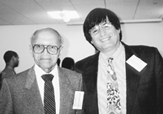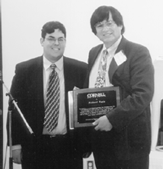Blackwell-Tapia Lecture Series Is Inaugurated at Cornell Conference
January 9, 2001

David Blackwell (left) and Richard Tapia were honored for their achievements, both mathematical and personal, at a conference held last spring at Cornell University. With the conference, Cornell inaugurated the David Blackwell and Richard Tapia Distinguished Lecture Series in the Mathematical and Statistical Sciences, to be given every other year, beginning in 2002, by a distinguished African American, Latino, or Native American mathematician.
On May 7 and 8, Cornell University held a conference to inaugurate the David Blackwell and Richard Tapia Distinguished Lecture Series in the Mathematical and Statistical Sciences. Both Blackwell, a professor emeritus of mathematics at the University of California, Berkeley, and Tapia, the Noah Harding Professor of Computational and Applied Mathematics at Rice University, attended the two-day conference, which highlighted their contributions as well as those of a new generation of under-represented minority mathematicians and statisticians.
The lecture series, established at the initiative of Cornell administrators and faculty, will be given every two years by a distinguished African American, Latino, or Native American mathematician. The lecturer will receive a plaque and an honorarium of $1000. The first speaker will be selected in 2002.
"We, the minority communities at Cornell University, would like to honor the mathematical and personal achievements of David Blackwell and Richard Tapia," said Carlos Castillo-Chavez, one of the organizers of the conference and an instigator of the new lecture series. "We feel that it is critically important that current and future generations of African Americans, Latinos, and Native Americans, as well as current and future generations of non-minorities, learn and remember the achievements of these two extraordinarily talented and productive mathematicians. The establishment of this lecture series also recognizes their continuous efforts in creating, supporting, and maintaining opportunities for minority scientists, statisticians and mathematicians across the nation."
Remembering the Achievements of Two Distinguished Mathematicians
David Blackwell completed his graduate studies at the University of Illinois, Urbana-Champaign, in 1941. He taught at Southern University, Clark College, and Howard University (where he chaired the mathematics department) before joining the Berkeley faculty in 1954. He has contributed to several areas of mathematics---set theory, measure theory, probability theory, statistics, game theory, and dynamic programming---and is co-developer of the Rao-Blackwell theorem used in estimation theory and tests of hypotheses. He is an author of the classic book Theory of Games and Statistical Decisions.
Blackwell is a former vice-president of the American Mathematical Society and a former president of the Institute of Mathematical Statistics. He was elected to the National Academy of Sciences in 1965 and also is a member of the American Academy of Arts and Sciences. His numerous other honors and awards include the R.A. Fisher Award and the TIMS/ORSA John von Neumann Theory Prize.
Richard Tapia, born in Los Angeles to parents who had emigrated from Mexico as teenagers, received his PhD from the University of California at Los Angeles. He has contributed to mathematical optimization theory and iterative methods for nonlinear problems. His current research is in the area of algorithms for constrained optimization problems and interior-point methods for linear and nonlinear programming. Thanks in large part to the efforts of Tapia, the computational and applied mathematics department at Rice has become a national leader in promoting women and underrepresented minority PhD recipients in the mathematical sciences.
Tapia was the first native-born Hispanic elected to the National Academy of Engineering (in 1994). His recent honors include a Lifetime Mentor Award from the American Association for the Advancement of Science (1998); appointment to the National Science Board by President Clinton (1996); and a Presidential Award for Excellence in Science, Mathematics, and Engineering Mentoring. In 1996 he was named Hispanic Engineer of the Year by Hispanic Engineer Magazine.
Focus on Research of Underrepresented Minorities
In addition to honoring Blackwell and Tapia, the lecture series was created to provide a forum for highlighting the research of African American, Latino, and Native American mathematicians and statisticians. In this way, the series will promote increased participation of underrepresented minorities in mathematics and statistics. Hence, a small conference will be organized as part of each lecture series, with selected young mathematicians and statisticians from around the nation presenting their work.
The lecture series is supported in part by Cornell's Center for Applied Mathematics and the Departments of Mathematics, Statistics, Biometrics, and Theoretical and Applied Mechanics. The members of the organizing committee for the May conference were Joe Buhler, UC Berkeley; Abdul-Aziz Yakubu, Howard University; Robert L. Harris Jr., vice provost for diversity and faculty development and professor of African studies at Cornell; and Castillo-Chavez, a professor of biomathematics and director of the Mathematical and Theoretical Biology Institute at Cornell.

Jaime Barrera (left), a third-year PhD student in applied mathematics at Cornell, with Richard Tapia.
Approximately a hundred people attended the conference, which began with an opening reception, after which Persi Diaconis of Stanford University gave a talk titled "Probability, Statistics and the Zeros of the Zeta function." On May 8, 12 selected minority scientists, all near the beginning of their careers, had the opportunity to discuss their research in 20-minute presentations; topics included quantum chaos in vibrating billiard systems and the dynamics of two strains of influenza.
The eight Cornell-Sloan Graduate Student Fellows* hosted a luncheon on May 8, with invited speakers Denise Stephenson-Hawk, provost of Spelman College, and Albert Bridgewater, the senior science adviser of NSF. "The individual successes of Blackwell and Tapia change the nature of the debate on underrepresentation of minorities in scientific and technical fields," Bridgewater said. "Their careers starkly challenge others to do as well as they have done."
After the luncheon, Tapia gave a lecture, "If it Is Fast, Must it Always Be Newton's Method?" In the lecture, he reformulated several fast numerical methods and showed that they could be written as generalizations of Newton's method.
The conference ended with a banquet at the Statler Hotel. Margaret Wright, department head of scientific computing research at Bell Laboratories, Lucent Technologies, gave a tribute to Richard Tapia, and James Donaldson, dean of the College of Arts and Sciences at Howard University, honored David Blackwell. Describing Blackwell as an "authentic legend," Donaldson pointed out that he had "soared to magnificent heights in his profession during an era where repressive forces had thwarted the aspirations of persons of equal talent; he, through word and, especially, deed, has advanced opportunities in mathematics and science for all people, especially for those from disadvantaged groups."
Looking back on his own career, Castillo-Chavez identified Tapia as a role model for him as a graduate student and even earlier, during his undergraduate years: Tapia "served as an inspiration . . . and helped me to imagine myself as a mathematician because I knew there was at least one other person like me."
*These students are the recipients of three- and four-year graduate school fellowships funded by the Sloan Foundation and Cornell University to pursue doctoral degrees in the fields of applied mathematics and biometrics at Cornell.Melissa Castillo-Garsow is a junior at Ithaca High School, where she serves as news editor of the Tattler, her high school newspaper, and as an intern at The Ithaca Journal.
This article was adapted from "The David Blackwell and Richard Tapia Distinguished Lecture Series in the Mathematical and Statistical Sciences," Making Strides, Vol. 2, No. 4, October 2000.

